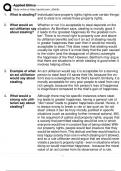Summary
Summary Applied Ethics - Moral Philosophy A Level Philosophy AQA
- Course
- Institution
Virtue Ethics/Aristotle - Moral Philosophy A Level Philosophy AQA. From an A* student. Can also provide access to digital quizlet flashcards if asked.
[Show more]



